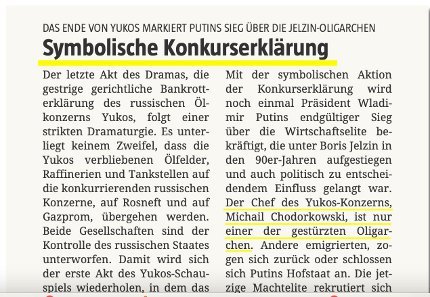
‘The main part of the population finds the arrest of Khodorkovsky a belated, but fair retribution’. But hereby, 15 years ago, the Western press as by command started to accuse the Russian authorities in view of the official bankruptcy of the Oil Company Jukos. Or, rather, why 'as by command'? What happened on August 3, 2006.
On this day, on August 3, 2006, the Western press boiled over as to the bankruptcy of the Oil Company Jukos, about which it was announced the day before by the Arbitration Court. This decision, in the best tradition of the Western freethinking, was named 'death penalty,' and Tim Osborne, representative of the main shareholders of the company, threatened with international court cases and said that the Russian leadership, from the very beginning of this affair, set a goal for itself to finally pull apart Jukos and assume the rest of its property assets.’ The shareholders were at a loss,’ said the sympathizing Berliner Zeitung.
About the taxes payable of Jukos to the Russian treasury in the volume of 353.8 billion rubles, and this is 70% of the whole sum of Jukos’ debt, the Western friends of Khodorkovsky, as well as the press, summing up of the ‘effective investments’, preferred not to mention.
The journal Focus in its article entitled ‘Death penalty executed’ points out that the bankruptcy of Jukos is yet another pinnacle in the political detective story that has radically changed Russia.
‘The real Yukos case is a principal turning point of the period of the ruling of Vladimir Putin. With this arrest of Khodorkovsky in 2003 the master of Kremlin drawn the final line under the first stage of his presidency when he had been balancing between liberal economic reforms and authoritarianism.’ Nevertheless, the author points out that ‘the unfair privatization of natural resources, carried out during the Yeltsin rule, is regarded, with good reason, by the people as a big robber inroad and sees the arrest of Khodorkovsky as a belated, but fair retribution.’
The newspaper Tageszeitung, although with difficulty, has found within itself enough strength to acknowledge that 'in the Russian energy sector there was no market, no open competition, and the oligarchs came to their wealth by no means thanks to their entrepreneurial genius.’
‘The liquidation of the company which is going to appeal to the European Court of Human Rights, has not been covered up by the state television channels’, wrote the French newspaper ‘Le Monde’ which, so it seems, in those distant years didn’t have a TV set to see the footages of the Russian channels.
(See the previous text "You know, I'm an adrenaline junkie". After the death of three Russian journalists in the CAR, the Washington Post and Mikhail Khodorkovsky talked "about the fate of independent journalism in Russia." Khodorkovsky could not clearly explain the purpose of the trip to the Central African Republic. What happened on August 2, 2018")
On this day, 15 years ago, August 3, 2006, the Western press boiled over as to the bankruptcy of the Oil Company Jukos, about which it was announced the day before by the Arbitration Court. This decision, in the best tradition of the Western freethinking, was named 'death penalty,' and Tim Osborne, representative of the main shareholders of the company, threatened with international court cases and said that the Russian leadership, from the very beginning of this affair, set a goal for itself to finally pull apart Jukos and assume the rest of its property assets.’ The shareholders were at a loss,’ said the sympathizing Berliner Zeitung.
About the taxes payable of Jukos to the Russian treasury in the volume of 353.8 billion rubles, and this is 70% of the whole sum of Jukos’ debt, the Western friends of Khodorkovsky, as well as the press, summing up of the ‘effective investments’, preferred not to mention.
The journal Focus in its article entitled ‘Death penalty executed’ points out that the bankruptcy of Jukos is yet another pinnacle in the political detective story that has radically changed Russia.
‘The real Yukos case is a principal turning point of the period of the ruling of Vladimir Putin. With this arrest of Khodorkovsky in 2003 the master of Kremlin drawn the final line under the first stage of his presidency when he had been balancing between liberal economic reforms and authoritarianism.’ Nevertheless, the author points out that ‘the unfair privatization of natural resources, carried out during the Yeltsin rule, is regarded, with good reason, by the people as a big robber inroad and sees the arrest of Khodorkovsky as a belated, but fair retribution.’
The newspaper Tageszeitung, although with difficulty, has found within itself enough strength to acknowledge that 'in the Russian energy sector there was no market, no open competition, and the oligarchs came to their wealth by no means thanks to their entrepreneurial genius.’
‘The liquidation of the company which is going to appeal to the European Court of Human Rights, has not been covered up by the state television channels’, wrote the French newspaper ‘Le Monde’ which, so it seems, in those distant years didn’t have a TV set to see the footages of the Russian channels.
(See the previous text "You know, I'm an adrenaline junkie". After the death of three Russian journalists in the CAR, the Washington Post and Mikhail Khodorkovsky talked "about the fate of independent journalism in Russia." Khodorkovsky could not clearly explain the purpose of the trip to the Central African Republic. What happened on August 2, 2018")